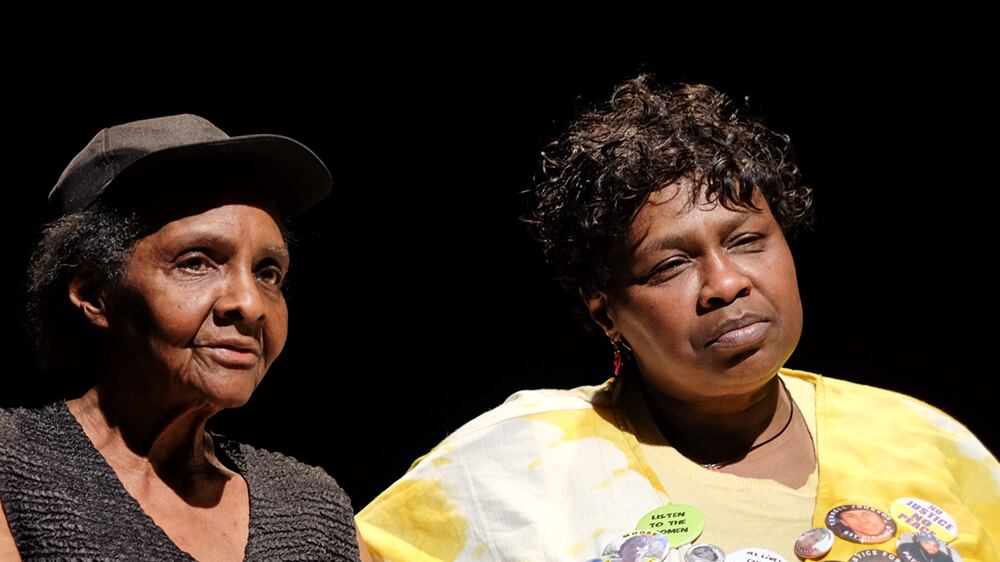Consecutively absorbing the stories of nine different Portlanders killed by police, a Silent Voices viewer might notice commonalities seldom seen in headlines or hearings.
Several of those killed were experiencing the worst crises of their lives before police ever arrived on the scene. Others share prior encounters with the same cops who killed them. Mental illness is a recurring theme. Then, there's the credo upon which Silent Voices creator and writer Donna Hayes ends every monologue in her film: "That ain't right."
That repetition prioritizes a simple human morality over more conceptual designations—what a parent or a child would deem "right" as opposed to what a legal system deems "justified."
"The police weren't considering these low moments," Hayes says of the nine slayings she chronicles. "They didn't think about these people and what's going on in their lives. Suspect! Danger! Danger! I hate the word 'suspect' because it takes humanity away."
Hayes' artistic life began with Silent Voices—and tragically so. Her grandson was Quanice "Moose" Hayes, an unarmed, Black 17-year-old shot to death by Portland police on Feb. 9, 2017. The killing sparked ongoing protests and a civil rights lawsuit by the Hayes family. On March 21, 2017, a Multnomah County grand jury called officer Andrew Hearst's use of deadly force "justified."
"The grand juries always do," says Silent Voices' director of performance, Kathryn Kendall, a retired theater professor and Don't Shoot PDX photographer who helped Donna Hayes shape her collected stories of police violence into the monologues.
Moose's soliloquy caps the film, which is available for free via Open Signal's YouTube page, following first-person testimonials by Kendra James, Aaron Campbell, Bodhi Phelps, Brad Lee Morgan, Christopher Kalonji, Merle Hatch, Jack Collins and John Elifritz.
While the victims' narration of their fatal encounters with Portland metro-area law enforcement certainly stands out, they also offer detail-heavy snapshots of lives cut short: Collins' amateur boxing career, Elifritz's family movie nights, Campbell losing his brother on the same day as his own death.
Interspersed among the monologues is a "chorus" of pundits, three actors dramatizing verbatim internet comments about the killings. Some remarks trend toward the hateful, of course. Some honor the deceased, seemingly for political capital. Whatever the intent, the chorus largely reveals how public discourse on police violence has precious little to do with the victims' humanity.
"I had more anger than pain," Hayes says of diving through comment sections after Moose's death. "No matter what they said, it didn't relate to [Moose]. How are you going to open your mouth and talk about someone you don't know?"
The final product of Silent Voices—for now—is 50 minutes of filmed, DIY black-box theater. Last winter's plans to simply host a live reading of Hayes' script shifted due to COVID-19, but video production volunteers, like Olivia Alsept-Ellis, Jessica Daugherty, Mike Hull and Lloyd Lemmermann, and a stage donated by Portland Playhouse allowed the transition to a filmed document. Kendall, for one, harbors future theatrical hopes for Silent Voices.
"I really feel it needs a Black director," Kendall says, "and I hope one comes forward who has the enthusiasm and the nerve to make something quite different than the movie."
Meanwhile, Hayes has broader ambitions to continue penning first-person accounts on behalf of those killed by police in communities like Detroit and New Orleans, where she's forged connections with victims' families. As for the responsibility that comes with depicting these personal narratives, Hayes welcomes it. Even her business card now reads, "Speaker for the Dead."
"People need to know these were people," Hayes says.
Attentive viewers may notice one differentiating wrinkle in Moose's concluding monologue, delivered by Portland actor Solaman Ibe (who also plays Aaron Campbell). Twice, Moose halts his description of his immense but tight-knit family, where grandmothers are like second mothers and aunts like siblings. These memories are tough to get through, he admits.
The emotional pauses might feel like Hayes tipping her hand. In the ninth and final narrative, maybe it's all just too personal to bear.
"No," says Donna Hayes, speaker for the dead. "That was Moose. He could be emotional when it came to his family. He loved them dearly."
SEE IT: Silent Voices streams at watch.opensignalpdx.org/premieres. Free.

